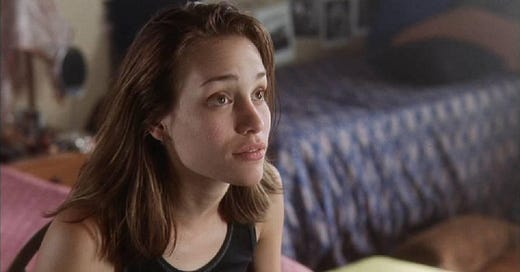Directed: Léa Pool
Written: Judith Thompson and Susan Swan
Lost & Delirious was 2001's All Over Me or Fucking Åmål, with a new bunch of kids in a new situation but with the same angst; how do you survive being a teenager and being gay? In any case to look at Lost & Delirious as a "lesbian" film is to limit its possibilities. It is has universal themes; love, the ecstasy of first passion and the pain of first loss. There are few among us who can't relate to that, regardless of our sexuality.
Mary (Mischa Barton) is a new girl at boarding school. She's resentful of her emotionally detached father and stepmother for sending her away and distraught over losing her mother some years before. Painfully shy, she finds herself rooming with two very unconventional and outgoing girls: Paulie (Piper Perabo) and Tori (Jessica Paré). They are best friends and, as Mary soon finds out, lovers as well.
One fateful day the secret lovers are discovered. Unable to deal with the fallout of coming out, Tori abruptly ends the relationship. Paulie tries everything in her power to win Tori back, with disastrous consequences. Mary watches helplessly as Paulie is consumed by the intensity of her own sorrow and passions.
Many reviews have said this and I’ll echo it - Lost & Delirious doesn't contain much startling or new. There are many films I could list as influences, but it did feel a bit like a Dead Poets Society for girls, where the so-called war is being fought over the hearts and souls of young girls who are drowning in their own attempts to grow and change.
What distinguishes this film can be expressed in two words - Piper Perabo. I was less impressed by her eye-candy turn in Coyote Ugly, there is only so much you can do when the material you have to work with is so flawed. Paulie must have been an irresistable challenge; she's intense, passionate, gorgeous without being aware of it, and gloriously articulate. The dialogue could have sounded contrived and trite in the mouth of a less skilled actress, but surprisingly even the most clunky of passages work here.
Perabo and Barton both have exciting screen presences, so much so their performances gave the film a lopsided feel as they overwhelmed all the rest of the cast, and to some extent even the plot. Particularly dwarfed was the insipid Tori, but that was partly the intention. She was the shrew, so she had to be unsympathetic. Unfortunately she was also unforgiveably dull.
Paulie is a modern day swashbuckler and poet, romantic and idealistic. As we all know these characters are always destined for tragedy. They are simply unequipped to deal with the destruction of their ideals. Director Léa Pool attempts to tell the story of the "star cross'd lovers" through the eyes of naive observer Mary, who goes through some interesting changes of her own as she witnesses Paulie's transformation.
Pool doesn't shy away from showing intimacy where necessary, but not more than is necessary. She gets the simple things right. I believed in Paulie's love for Tori. The film would have flopped if that hadn't worked, as so many others have in the past.
Perhaps the symbolic nature of the script could have been handled with more subtlety. Mary is a nurturer who spends time in the garden digging and planting. Paulie is the wild spirit who takes a wounded Raptor and teaches it to fly again. Tori gets stuck in the middle of these two forces, unable to gather the courage to be herself. She's such a weakling that the real tragedy here is that she was not worth fighting for in the first place.
But Paulie's fight for Tori is also a fight for sexual and individual freedom, a battle against her own demons. Some people were angry at the tragic ending, but I was too busy crying to be mad. There was something so utterly sad-yet-satisfying about the Raptor as she tries desperately to fly to freedom, and fails as we know she must.






